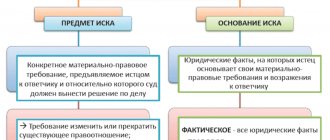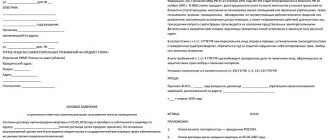Features of the discharge of a person with temporary registration
To evict a person with temporary registration from an apartment without mutual agreement, compelling reasons will be required. The legislation of the Russian Federation defines a procedure that involves initially trying peaceful ways to resolve the dispute.
- How to discharge a person with temporary registration from an apartment?
- Grounds for discharge without consent
- The procedure for discharging a person with temporary registration
- Expiration of registration period
- Voluntary deregistration
- Extract by court decision
- Statement of claim for the discharge of a person with temporary registration without his consent
- What documents are needed?
- Duration of the procedure
- Cost of the procedure
To evict a person with temporary registration from an apartment without mutual agreement, compelling reasons will be required. The legislation of the Russian Federation defines a procedure that involves initially trying peaceful ways to resolve the dispute.
How long does it take to register?
The territorial division of the Ministry of Internal Affairs is obliged to register you at your place of stay no later than the next working day if you submitted documents in person. If you brought all the documents with you, including an extract from the Unified State Register of Real Estate, the registration certificate will be issued immediately.
This period can be extended to 8 working days if you are registering on the basis of a certificate of state registration of the right to residential premises or a social tenancy agreement and have not provided supporting documents. During this time, the registration authority itself will request the necessary data.
If documents are submitted through the MFC or sent by Russian Post, the department of the Ministry of Internal Affairs is obliged to register you within 8 working days after receiving the documents. It will take a few more days to mail or transfer documents from the MFC to the Ministry of Internal Affairs and back.
How to discharge a temporarily registered person without his consent?
The law of the Russian Federation allows the owner of a property to write out a temporarily registered person without his consent ahead of schedule, if there are compelling reasons for doing so. First, let's figure out what temporary registration is.
Temporary registration is needed when a person does not live at the place of permanent registration for more than one and a half months. It can be issued by agreement with the owner of the living space for a period of no more than five years.
Important! Staying in another city without registration for more than 90 days is punishable by a fine. If you receive a temporary residence permit, then there is no need to leave your permanent place of residence.
The law of the Russian Federation allows the owner of a property to write out a temporarily registered person without his consent ahead of schedule, if there are compelling reasons for doing so. First, let's figure out what temporary registration is.
Deadlines
The case is considered within two months from the moment the application is accepted by the court. Sometimes the trial period is extended for another month, but usually 1-2 meetings are enough. If the defendant was absent at the time the decision was made, it comes into force 7 days from the moment he receives a copy. If he was in place, the decision will take effect a month later.
If the application is submitted by a legal entity, the state fee will be 6,000 rubles.
What is temporary registration
The period for which a citizen is registered in a residential premises is negotiated with the owner of the property. Recently, there has been a trend of temporary registration when renting out apartments: the period of registration coincides with the period of renting housing.
Non-permanent registration can only be issued in the personal presence of the property owner. The necessary documents are submitted to the Federal Migration Service, and the citizen does not have to be discharged from his permanent place of residence.
List of documents required for temporary registration:
- Application in the prescribed form. The form is filled out by the citizen applying for registration, and the owner of the home puts his signature on it.
- Passport of a citizen of the Russian Federation. Temporary registration using a foreign passport or other documents is not possible.
- Documents – grounds for a citizen’s registration, for example, a rental agreement.
- To register a non-permanent registration in a private household, the required document is a house register.
You can obtain registration in other alternative ways:
- Option 1. Send an application to the Federal Migration Service by registered mail. In this case, the notarized consent of the apartment owner for registration is added to the mandatory list of documents. If all the paperwork is completed correctly, the applicant is sent a notice with the date when he must appear in person to receive a certificate of registration.
- Option 2. Register on the State Services website and in the Federal Migration Service section and complete all necessary actions.
- Option 1. Send an application to the Federal Migration Service by registered mail. In this case, the notarized consent of the apartment owner for registration is added to the mandatory list of documents. If all the paperwork is completed correctly, the applicant is sent a notice with the date when he must appear in person to receive a certificate of registration.
- Option 2. Register on the State Services website and in the Federal Migration Service section and complete all necessary actions.
Judicial procedure for removal from temporary registration
The statement of claim is filed with the district court at the place of temporary registration of the defendant, i.e. lodger. The state duty for cases of this category in 2021 is 300 rubles (clause 3, clause 1, article 333.19 of the Tax Code of the Russian Federation).
Payment details can be obtained directly from the court, or downloaded from official courts.
The following must be attached to the statement of claim for removal: • copies of documents on ownership; • copies of passport; • copy of the registration certificate; • a copy of the contract and other evidence on which the plaintiff bases his claims.
The application is made in 2 copies: for the court and for the defendant. After a positive decision is made and it enters into legal force (after 1 month), this judicial act is submitted to the Department of Internal Affairs of the Ministry of Internal Affairs of the Russian Federation, and the defendant is removed from registration at the place of residence.
Where to contact?
✅ Documents
Along with the application, the plaintiff submits the following documents:
- copy of passport;
- title documents for the apartment (sale and purchase agreement, inheritance, gift);
- receipts for utility bills;
- an extract from the house register;
- certificate of divorce (if spouses divorce);
- confirmation of violations on the part of the tenant - testimony of neighbors, expert opinions on the amount of losses due to damage to property, etc.
- receipt for payment of state duty;
- a copy of the defendant's notice of transfer of the case to court.
Evidence must complement the overall picture of what happened. The court will take the plaintiff’s side if the arguments confirm the fact of violations on the part of the temporarily registered person.
How to discharge a temporarily registered person ahead of schedule?
Share on social media networks:
Registration of permanent and temporary registration, as well as deregistration of citizens from apartments, is regulated by Decree of the Government of the Russian Federation No. 713. According to the Law, the owner of an apartment has the right to expel from the apartment any person temporarily registered in it, if there are compelling reasons for this.
What is temporary registration and what are the features of its registration? How can a temporarily registered person be discharged ahead of schedule? Is it possible to discharge a person without the consent of the owner? Where should I go to get deregistered? What list of documents must be provided?
Temporary registration is required for:
Definition of concepts
To understand the essence of the problem, it is necessary to define several terms:
The basic rights and obligations of apartment owners and persons who have received the right to use residential premises are established in Chapter 5 of the Housing Code of the Russian Federation. This regulatory act specifies cases in which a citizen may be deprived of the right to use a specific apartment.
First you need to check the reason for the temporary registration
Before the transaction, the owner of the apartment must provide a certificate of the residents registered in the apartment.
Previously, such a document was an extract from the house register. In 2018, house books were cancelled. Now, instead of checking out, the owner of the apartment receives a certificate in form No. 9 - or another document, depending on the region of residence.
For example, in Moscow they issue a unified housing document (EZhN).
The EZHN indicates all registered persons, information about debts for housing and communal services and data about rights to an apartment Source:
Information about the residents registered in the apartment is given to the owner. Information will be provided to the realtor only with a notarized power of attorney from the owner of the apartment.
The certificate indicates whether the residents are permanently or temporarily registered. If temporary, then for how long Source:
How to discharge a temporarily registered person without his consent?
The law obliges citizens to obtain permanent or temporary registration in one of the regions of Russia. It is much easier to conclude an agreement with the owner of the apartment and register on a temporary basis without ownership of the apartment. The expiration of the agreement will lead to the automatic discharge of the temporarily registered person.
But what to do when you need to discharge a temporary tenant without his consent? For example, in the case of systematic drunkenness or damage to property in the apartment. There is only one legal way.
But what to do when you need to discharge a temporary tenant without his consent? For example, in the case of systematic drunkenness or damage to property in the apartment. There is only one legal way.
Grounds for forced discharge
The grounds for removing a person from an apartment without his consent may be as follows:
- the person has not been at the registered address for a long time;
- there was arrears in payment for housing and communal services;
- the person regularly violated public order, caused conflicts, and was drunk;
- the resident used the apartment to equip a workshop, studio or for other purposes not consistent with its purpose;
- the person registered in the apartment is divorcing his spouse-owner.
The applicant will need to provide evidentiary documents that confirm the existence of grounds for the forced discharge of the person.
First of all, it is necessary to try to deregister the person on a voluntary basis. Even if it doesn’t work out, the owner will have evidence of attempts to resolve the conflict situation peacefully.
Option one - drawing up a power of attorney
Legal relations related to deregistration at the place of residence are documented in writing by the citizen representing the interests. This could be anyone - an acquaintance, a friend, a brother, a company employee or a lawyer. A power of attorney allows you to transfer the authority to issue an extract to an authorized person. Where to go to draw up a power of attorney and how to write it out?
Instructions for issuing a power of attorney
1. Step one – visit a notary
Contact the notary office at your place of residence and report your desire to issue a power of attorney. It is advisable for the citizen representing your interests in the future to be present. This way the notary will be confident that the transaction is legal and completed by voluntary consent.
During the process of filling out the documentation, the notary will tell you how to complete it correctly. The power of attorney must contain the following information:
- Full name, passport details of yours and your representative.
- Name of the trust document (a simple document is issued for the extract).
- Duration of validity of the trust document.
- The wording of authority is deregistration or registration.
- Date of document execution.
- Notarization.
Please note that an application for deregistration (form No. 6) is drawn up along with the power of attorney. The application contains the name of the UVM department, contact details of the citizen who is being discharged, as well as the addresses of discharge and future registration. If you do not yet know about the future registration address, you are allowed to leave the entry “New address unknown.” Next, the notary's stamp is affixed.
List of documentation for discharge through a representative:
- Principal's passport.
- Application and power of attorney certified by a notary.
- Departure address sheet.
- Photocopy of the representative's passport.
- Statistical sheet of departure (when the principal moves to another country).
As already mentioned, Migration Service employees may refuse the procedure for deregistration. In such a situation, you can send a complaint to your superiors or file a lawsuit.
2. Step two – issuing an extract with a trust document
After receiving the documentation, the representative contacts the Department of Internal Affairs, the MFC or the housing department of the management company. Receiving documents does not take much time. Inspectors check the documentation and set a completion date. Then, the representative picks up the passport at the appointed time and sends it to the principal. This completes the discharge procedure without personal presence.
Remember that deregistration from the old living space and registration at the new residential address are two different services. Therefore, before registering at a new place of residence, you must first cancel your registration at your current one.
Extract through the State Services website
To register online, you need to go to the State Services website. To use the option of electronically issuing statements, you must be registered on the site.
Login to the site. Select the “Popular on the portal” section. There, find and click on the entry “Registration at place of residence or stay.”
Select the appropriate item “Deregistration at the place of residence.” Further:
- select the type of service received - electronic service;
- if necessary, log in to the portal (click on the “Login” link and enter your portal registration data).
On the right side there is a “Get service” button. Click it and fill out all the required fields:
- type of applicant (the application can be submitted for yourself, as a representative of your child or an incapacitated relative);
- your personal and passport data;
- old and new registration address;
- indicate the reason for deregistration (conscription for military service, conviction to imprisonment, recognition as missing, death, etc.);
- indicate whether you have another citizenship, as well as other additional data;
- and at the end, select a department convenient for visiting;
- Check the box next to your consent to the processing of personal data.
Click the "Submit" button. And wait for a notification in your personal account about the date of the FMS visit.
Three days later (at the appointed time) come to the address you specified on the branch’s website. You need to take the original documents with you to present them.
Attention ! Since 2002, those who are faced with a requirement to present a military ID can file a complaint with higher authorities, since the requirement for a military ID is illegal.
Registration algorithm: register step by step
Let us clarify right away: to register at a new address, you do not need to first register at the old one. The current procedure provides for simultaneous registration and deregistration at the old address without additional application. Registration is managed by the territorial divisions of the Ministry of Internal Affairs - the migration departments (OMB). You can go there personally or use the services of such intermediaries - persons responsible for receiving and transmitting documents to the police. Depending on the type of housing stock and the features of its management, these may be:
- local housing department officials;
- owners of residential premises who independently manage the housing stock;
- responsible employees of housing cooperatives, residential complexes, homeowners' associations, management organizations;
- officials of multifunctional centers.
Children's rights to living space and registration in an apartment
For a citizen who is a minor, the Constitution of the Russian Federation and the Family Code guarantee him housing.
From these documents it follows that children under 18 years of age can be registered in the apartment where their parents and other legal representatives are registered: guardians, adoptive parents. Thus, they have the rights to own the residential premises (apartment) that belong to them. Representatives determined by the Law register a minor citizen in a non-privatized, private apartment they occupy. This provision, enshrined in Article 20 of the Civil Code of the Russian Federation, is kept under the control of the guardianship and trusteeship authorities. There are cases when the father and mother live and are registered in different places.
Then he is prescribed to one of them. This operation does not require the approval of all persons living in the apartment where the child is to be registered. Before starting to discharge him from the apartment, you need to obtain the consent of his father and mother (one of them), the guardianship authorities must give their permission, otherwise the discharge is accompanied by an appeal to the court, its decision.
Difficulty in evicting registered children
Can I write it out? Can! The child follows the parent, this is evidenced by the current legislation (FMS Order No. 288 of September 11, 2012, approving the Regulations for the provision of services by the FMS for registration of citizens of the Russian Federation); Rules for registration and deregistration of citizens, clause 28. In other words, the legal basis for deregistration is termination of registration of the father or mother.
Where children are discharged after completing their registration is where they should be: at the address where their mother or father is registered. However, if it turns out that the little person will have nowhere to go, then at least you will not immediately kick out this family. At most, you will have to endure them for several months.
Many are afraid that rent will change. Yes. For the worse, that is, for the better, especially if there are no water meters. It is better to foresee this case in advance by agreeing with your guests on payment issues.
Submitting an application through State Services
Many parents and guardians register their child by completing documents through the State Services portal. To use the functionality of the site, you must register and obtain an electronic signature. Documents for remote application submission should be converted into electronic form and uploaded on the “FMS Services” page.
The electronic application form is also filled out there, and the correctness of submission is automatically checked by the system. After processing the application, a notification of invitation to the territory will be sent to the email address specified by the applicant. FMS body for studying registration documents.
What to remember
- Permanent registration is issued within 7 days from the date of entry into a new place of residence.
- There is no need to register at your old address in advance; registration is carried out automatically upon registration in a new apartment. You are not in danger of being evicted from your apartment through the court.
- You can register through the MFC, State Services, management organization or directly from the Ministry of Internal Affairs. Registration is free.
- The fastest way is to apply for registration in person through the Ministry of Internal Affairs - it will take no more than 3 days.
| Lyudmila Razumova Editor Practicing lawyer since 2006 |








